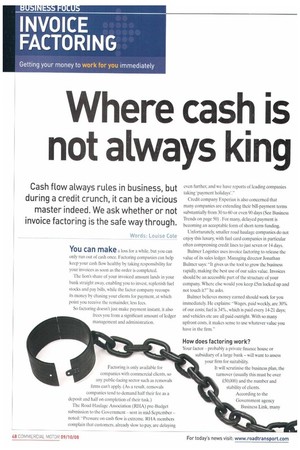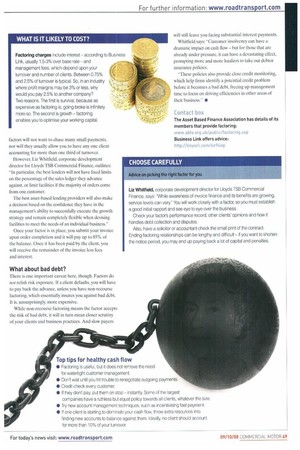Where cash is not always king
Page 48

Page 49

If you've noticed an error in this article please click here to report it so we can fix it.
Cash flow always rules in business, but during a credit crunch, it can be a vicious master indeed. We ask whether or not invoice factoring is the safe way through.
Words: Louise Cote You can make a loss for a while, but you can only run out of cash once. Factoring companies can help keep your cash flow healthy by taking responsibility for your invoices as soon as the order is completed.
The lion's share of your invoiced amount lands in your bank straight away, enabling you to invest, replenish fuel stocks and pay bills, while the factor company recoups its money by chasing your clients for payment, at which point you receive the remainder, less fees.
So factoring doesn't just make payment instant, it also frees you from a significant amount of ledger management and administration.
Factoring is only available for companies with commercial clients, so any public-facing sector such as removals firms can't apply. (As a result, removals companies tend to demand half their fee as a deposit and half on completion of their task.) The Road Haulage Association (RHA) pre-Budget submission to the Government — sent in mid-September — noted: "Pressure on cash flow is extreme. RHA members complain that customers, already slow to pay, are delaying even further, and we have reports of leading companies taking 'payment holidays'."
Credit company Experian is also concerned that many companies are extending their bill-payment terms substantially from 30 to 60 or even 90 days (See Business Trends on page 50) . For many, delayed payment is becoming an acceptable form of short-term funding.
Unfortunately, smaller road haulage companies do not enjoy this luxury, with fuel card companies in particular often compressing credit lines to just seven or 14 days.
Bulmer Logistics uses invoice factoring to release the value of its sales ledger. Managing director Jonathan Bulmer says: "It gives us the tool to grow the business rapidly, making the best use of our sales value. Invoices should be an accessible part of the structure of your company. Where else would you keep £.5m locked up and not touch it?" he asks.
Bulmer believes money earned should work for you immediately. He explains: "Wages, paid weekly, are 30% of our costs; fuel is 34%, which is paid every 14-21 days; and vehicles etc are all paid outright. With so many upfront costs, it makes sense to use whatever value you have in the firm."
How does factoring work?
Your factor — probably a private finance house or subsidiary of a large bank — will want to assess your firm for suitability.
It will scrutinise the business plan, the turnover (usually this must be over £50,000) and the number and stability of clients.
According to the Government agency Business Link, many factors will not want to chase many small payments, nor will they usually allow you to have any one client accounting for more than one third of turnover.
However, Liz Whitfield, corporate development director for Lloyds TSB Commercial Finance, outlines: "ln particular, the best lenders will not have fixed limits on the percentage of the sales ledger they advance against, or limit facilities if the majority of orders come from one customer.
The best asset-based lending providers will also make a decision based on the confidence they have in the managements ability to successfully execute the growth strategy and remain completely flexible when devising facilities to meet the needs of an individual business."
Once your factor is in place, you submit your invoice upon order completion and it will pay up to 85% of the balance. Once it has been paid by the client, you will receive the remainder of the invoice less fees and interest.
What about bad debt?
There is one important caveat here, though. Factors do not relish risk exposure. If a client defaults, you will have to pay back the advance, unless you have non-recourse factoring, which essentially insures you against bad debt. It is, unsurprisingly, more expensive.
While non-recourse factoring means the factor accepts the risk of bad debt, it will in turn mean closer scrutiny of your clients and business practices. And slow payers will still leave you facing substantial interest payments.
Whitfield says: "Customer insolvency can have a dramatic impact on cash flow but for those that are already under pressure, it can have a devastating effect, prompting more and more hauliers to take out debtor insurance policies.
"These policies also provide close credit monitoring, which help firms identify a potential credit problem before it becomes a bad debt, freeing up management time to focus on driving efficiencies in other areas of their business." •
Contact box
The Asset Based Finance Association has details of its members that provide factoring: wwwabfa.orq.uk/puutL/tacteng,asp ):1g.asp Business Link offers advice: http://tinyuri.com/6e94no Factoring charges include interest according to Business Link, usually 1.5-3% over base rate and management fees, which depend upon your turnover and number of clients. Between 0.75% and 2.5% of turnover is typical. So, in an industry where profit margins may be 3% or less, why would you pay 2.5% to another company? Two reasons. The first is survival, because as expensive as factoring is, going broke is infinitely more so. The second is growth factoring enables you to optimise your working capital.
CHOOSE CAREFULLY
Advice on picking the right factor for you Liz Whitfield, corporate development director for Lloyds TSB Commercial Finance, says: "While awareness of invoice finance and its benefits are growing, service levels can vary." You will work closely with a factor, so you must establish a good initial rapport and see eye to eye over the business.
Check your factor's performance record, other clients' opinions and how it handles debt collection and disputes.
Also, have a solicitor or accountant check the small print of the contract. Ending factoring relationships can be lengthy and difficult if you want to shorten the notice period, you may end up paying back a lot of capital and penalties.
Top tips for healthy cash flow
• Factoring is useful, but it does not remove the need for watertight customer management.
• Don't wait until you hit trouble to renegotiate outgoing payments.
• Credit check every customer.
• If they don't pay, put them on stop instantly. Some of the largest companies have a ruthless but equal policy towards all clients, whatever the size.
• Try new account management techniques, such as incentivising fast payment.
• If one client is starting to dominate your cash flow, throw extra resources into finding new accounts to balance against them. Ideally, no client should account for more than 10% of your turnover.








































































































































































